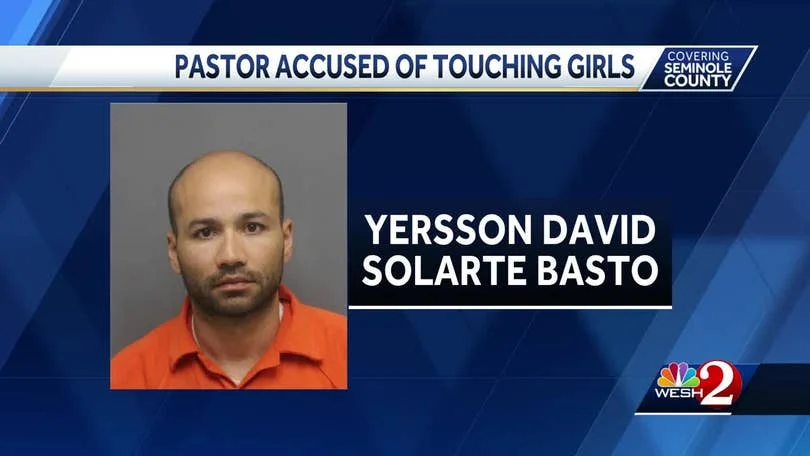
Unveiling the Shadows: How a Florida Church Leader’s Secrets Unraveled?
In a disturbing turn of events from Sanford, Florida, a trusted church leader has been accused of exploiting his position to commit heinous acts against vulnerable young members of his congregation. This case not only shocks the local community but also raises critical questions about trust, accountability, and the protection of minors in religious settings, underscoring the broader implications for societal safety.
Yersson Solarte, a 33-year-old pastor formerly at IPUL Pentecostal Church, now finds himself at the center of a scandal involving allegations of sexual assault and molestation of two underage girls. According to reports from the Sanford Police Department, the accusations surfaced on April 10, when one victim came forward detailing multiple incidents that occurred on church grounds. Solarte allegedly coerced the girls into inappropriate situations in his office and other church areas, making remarks that attempted to normalize his actions, such as telling one victim, "we only live once." In another harrowing account, he reportedly declared them a "couple" after unzipping his pants, leaving the victim so distressed that she requested to call her mother.
Investigators uncovered that Solarte's abuse extended to a second girl, whom he tried to manipulate by expressing false affection and even attempting to incite jealousy. These revelations paint a picture of calculated grooming, where Solarte weaponized his role as a spiritual guide to prey on trusting children. The Sanford Police Department, along with officers from Prince William County in Virginia, where Solarte was arrested on May 7 during a family trip, emphasized the severity of these charges: sexual assault on a victim under 18 and lewd and lascivious molestation of a victim under 16. Following the allegations, Solarte was immediately removed from his pastoral duties, highlighting the church's swift response but also sparking debates about whether such institutions have adequate safeguards in place.
This incident is particularly alarming when compared to similar cases of abuse in positions of authority, as it exposes the dark underbelly of unchecked power dynamics. Police Chief Cecil Smith described perpetrators like Solarte as "a special class of criminal, who use their position of trust to prey on innocent victims," a statement that resonates deeply in light of ongoing discussions about child protection. The repeated nature of the assaults, including on April 7, suggests a pattern that authorities fear may involve additional unreported victims. As the community grapples with this betrayal, it serves as a stark reminder of the need for stronger oversight and reporting mechanisms within religious organizations.
In conclusion, the arrest of Yersson Solarte and the ensuing investigation not only seek justice for the alleged victims but also prompt a larger conversation about preventing such abuses. What measures can communities implement to safeguard their most vulnerable? We encourage readers to reflect on this and share their thoughts in the comments below, as your insights could contribute to raising awareness and driving change.